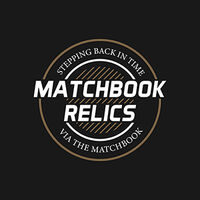In the mid-20th century, matchbooks were more than just everyday items for lighting cigarettes or stoves—they were powerful advertising tools that found their way into the realm of politics. Politicians and political movements ingeniously used matchbooks to promote their messages, connect with voters, and bolster their campaigns. This article explores how matchbooks were used in politics over the years, highlighting their role in election campaigns, issue advocacy, and public engagement.
The Rise of Matchbook Advertising in Politics
Matchbooks emerged as a popular advertising medium in the 1930s and 1940s, coinciding with the rise of mass-market consumer goods and the growth of advertising. Their portability, practicality, and low cost made them an attractive option for political campaigns. By the mid-20th century, matchbooks had become a staple in political advertising, serving as miniature billboards that could reach a wide audience.
Election Campaigns: Branding and Visibility
One of the primary uses of matchbooks in politics was during election campaigns. Candidates for local, state, and national offices used matchbooks to increase their visibility and spread their messages. Matchbook covers featured the candidate’s name, photo, party affiliation, and campaign slogans like "Vote for Change" or "Leadership You Can Trust." They often included critical information such as election dates and polling locations.
For example, during the 1960 presidential campaign, matchbooks bearing the images of John F. Kennedy and Richard Nixon were distributed widely, reminding voters of the candidates and their platforms. These matchbooks were handed out at campaign rallies, community events, and local businesses, ensuring that the candidates' names were constantly in the hands and minds of the electorate.
Advocacy and Issue Campaigns
Matchbooks were also used to promote specific political issues and advocacy campaigns. Organizations and movements advocating for civil rights, labor rights, and other causes used matchbooks to spread their messages. These matchbooks featured slogans, images, and information related to the cause, aiming to raise awareness and mobilize support.
For instance, matchbooks promoting labor unions might include messages about workers' rights and union benefits, accompanied by images of workers united in solidarity. Similarly, civil rights organizations used matchbooks to disseminate messages about equality and justice, encouraging people to join the movement and support legislative changes.
Public Engagement and Community Building
Political matchbooks played a crucial role in public engagement and community building. They were distributed at town hall meetings, political rallies, parades, and other community events, helping to foster a sense of connection and involvement among voters. By providing useful and practical items, political campaigns and organizations created tangible connections with the public.
Matchbooks also served as conversation starters, prompting discussions about candidates, issues, and elections. Their frequent use in social settings, such as bars, restaurants, and gatherings, ensured that political messages reached a diverse audience and sparked conversations that extended beyond the initial distribution.
Campaign Fundraising and Memorabilia
In addition to their use in voter outreach, matchbooks were also employed as fundraising tools. Political campaigns and organizations sold matchbooks as part of their fundraising efforts, with proceeds going to support campaign activities. Collectible matchbooks featuring popular candidates or significant political events became cherished memorabilia for supporters and collectors alike.
Special edition matchbooks were often created to commemorate important events, such as inaugurations, conventions, and anniversaries. These limited-edition items not only raised funds but also served as keepsakes that celebrated political milestones and achievements.
The Decline and Legacy of Political Matchbooks
With the advent of digital media and changing advertising trends, the use of matchbooks in political campaigns has declined. However, their legacy endures as a symbol of mid-20th-century political marketing. Vintage political matchbooks are now valued collectibles, offering a glimpse into the history of political advertising and the strategies used to connect with voters.
Conclusion
Matchbooks were a versatile and effective tool in political advertising, playing a significant role in election campaigns, issue advocacy, and public engagement. Their practicality, affordability, and wide reach made them ideal for spreading political messages and connecting with voters. While modern campaign strategies have evolved, the legacy of political matchbooks remains a fascinating chapter in the history of political communication. These small yet impactful items serve as reminders of the creative and innovative ways in which political messages were conveyed in the past.
